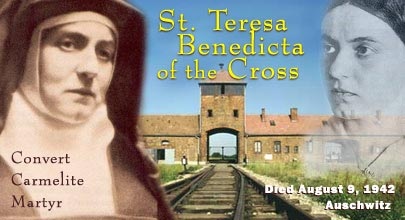 Saint Teresa (Edith Stein) Benedicta of the Cross
Saint Teresa (Edith Stein) Benedicta of the Cross
Image: PoliNation
(CNA) Born on Yom Kippur into a prominent Jewish family according to SQPN Edith was the youngest of seven siblings, she lost interest in Judaism as an adolescent.
Edith was a brilliant student and gravitated towards philosophy becoming a pupil in 1913 of the renowned Professor Edmund Husserl one of the most influential Philosophers of the 20th century. Through her studies, Edith met several Christians whose intellectual and spiritual lives she admired.
After earning her degree with the Highest Honors from Gottingen University in 1915 Edith worked as a Nurse in an Austrian field hospital during WW I — In 1916 Edith returned to academic work earning her Doctorate in Philosophy in 1917 after writing a highly regarded thesis according to EWTN on ‘The Problem of Empathy’ — During this time, Edith remained curious about Christianity was still uncertain about it.
Edith’s First Encounter With the Cross and Its Power:
One day at Frankfurt Cathedral Edith saw a Woman with a shopping basket going into kneel for a brief prayer. “This was something totally new to me. In the Synagogues and Protestant Churches I had visited, people simply went to the services, here however, I saw someone coming straight from the busy marketplace into this empty Church, as if she was going to have an intimate conversation. It was something that I never forgot.”
In 1921 while visiting friends, Edith spent an entire night reading the autobiography of the 16th century Carmelite Nun St. Teresa of Avila (Feast Day: 15 October) “When I finished reading the book,” Edith later recalled, “I said to myself: This is the truth.” Edith subsequently accepted Christ Jesus as her Savior was Baptized into the Catholic Church on New Years Day 1922
Intending to join the Carmelite’s immediately after her conversion, Edith would ultimately have to wait another 11 years — Instead, she would teach German and History at the Dominican Sisters school together with Teacher-Training at St. Magdeline’s Convent in Speyer. At the same time she was encouraged by Archabbot Raphael Walzer of Beuron Abbey, to accept extensive speaking engagements mainly on Women’s issues.
“During the time immediately before and quite sometime after my conversion I…thought that leading a religious life meant giving up all earthly things and having ones mind fixed on Divine things only. Gradually however I learned that other things are expected of us in this world…I even believe that the deeper someone is drawn to God the more he has to ‘go beyond himself’ in this sense, that is, go into the world and carry divine life into it.”
In 1933 darkness broke out over Germany with the rise of Nazi Fascism: “I had heard of severe measures against Jews before but now it dawned on me that God had laid his hand heavily on His people and that the destiny of these people would also be mine.” — Nazi ‘Aryan Law’ made it impossible now for Edith to continue teaching. “If I can not go on here then there are no longer any opportunities for me in Germany,” Edith wrote. “I had become a stranger in the world.”
Archabbot Walzer now no longer stopped Edith from entering Carmel, while in Speyer, she had already taken vows of poverty, chastity and obedience. Edith subsequently returned to her home for the last time to say ‘Good-Bye’ to her mother and her family. — Edith went to Synagogue with her mother, it was a difficult day for her and her mother.
“Why did you become acquainted with it,” (Christianity) Edith’s mother asked. “I didn’t want to say anything against Him, He may have been a very good person but why did He make Himself God?” — Edith’s mother cried.
The following day, Edith was on a train to Cologne. “I did not feel any passionate joy. What I had just experienced was too terrible but I felt a profound peace–in the safe haven of God’s will.” — From then on, Edith would write to her mother every week, though she never received any replies. Instead her sister Rosa sent her news from Berslau.
Edith Stein entered the Carmelite Convent in Cologne in 1933 and in the Habit the following year, taking the name ‘Teresa Benedicta of the Cross’ as a symbol of her acceptance of suffering.
“I felt,” Sister Teresa Benedicta wrote, ‘that those who understood the Cross of Christ should take upon themselves on everybody’s behalf.” Seeing it as her vocation, “To intercede with God for everyone” but she prayed especially for the Jews in Germany, whose tragic fate was becoming clear.
“I ask the Lord to accept my life and my death,” Sister Teresa Benedicta wrote in 1939 “so that the Lord will be accepted by His people and that His Kingdom may come in glory for the salvation of Germany and the peace of the world.”
After completing her final work a study of ‘St John of the Cross’ entitled The Science of the Cross Sister Teresa Benedicta was arrested by the Gastepo while she was in Chapel along with her sister Rosa (who had also become Catholic and was serving at the convent) together with members of her religious community.
They were subsequently taken to a transit camp in Amersfoort and later to Westerbork–this was in retaliation as a result to a protest letter written by the Dutch Bishops decrying the Nazi’s treatment of the Jews.
Sister Teresa Benedicta commented, “I never knew that people could be like this, neither did I know that my brothers and sisters would have to suffer like this…I will pray for the every hour. Will God hear my prayers? He will certainly hear them in their distress.”
Professor Jan Norta, who was greatly attached to Sister Teresa Benedicta wrote later: “She is a witness to God’s presence in a world where God is absent.”
On the 07 August early in the morning 987 Jews were deported to Auschwitz sometime between then on the 09 August, 1942 Sister Teresa Benedicta, her sister Rosa and many others were gassed by the Nazi’s.
When Sister Teresa Benedicta was Beatified in 1987 Pope Saint Paul II said, the Church ‘honored a daughter of Israel, who during the Nazi persecution remained united as a Catholic in fidelity and love to the Crucified Lord Jesus Christ and as a Jew, to her people.” Sister Teresa Benedicta was subsequently Canonized in 1998 by Pope John Paul II
More here from Franciscan Media
Related: Homily Pope Saint John Paul II Canonization of Edith Stein
Self Portrait in Letters (1916-1942) by Edith Stein –Amazon.com
Life in a Jewish Family by Edith Stein –Amazon.com
Today’s Bible Readings on the ‘Memorial of St. Teresa Benedicta of the Cross’ (Edith Stein) -USCCB
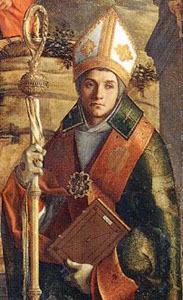
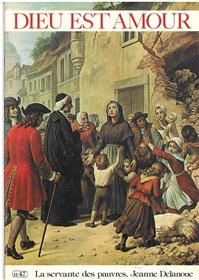
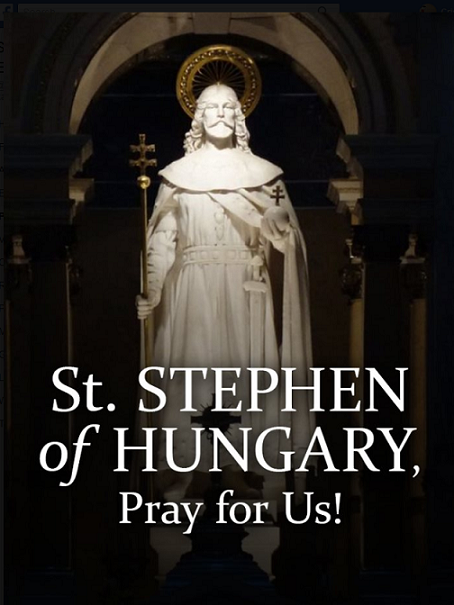 St. Stephen of Hungary (975-1038)
St. Stephen of Hungary (975-1038)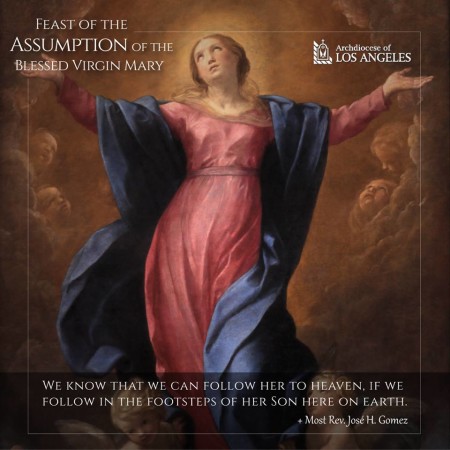 Assumption of the Feast of the Blessed Virgin Mary
Assumption of the Feast of the Blessed Virgin Mary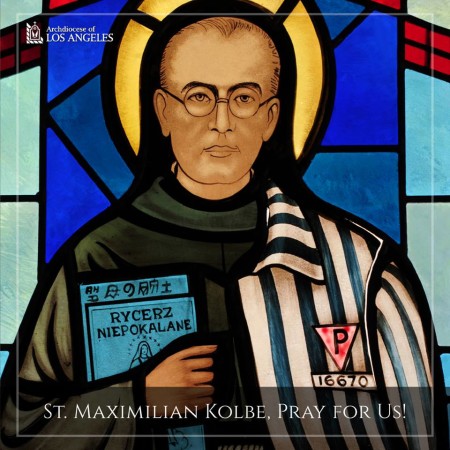 St. Maximilian Mary Kolbe (1894-1941)
St. Maximilian Mary Kolbe (1894-1941)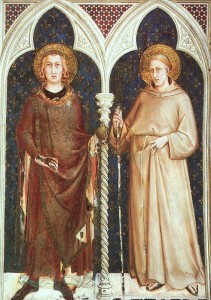 Pope Saint Pontian & Saint Hippolytus
Pope Saint Pontian & Saint Hippolytus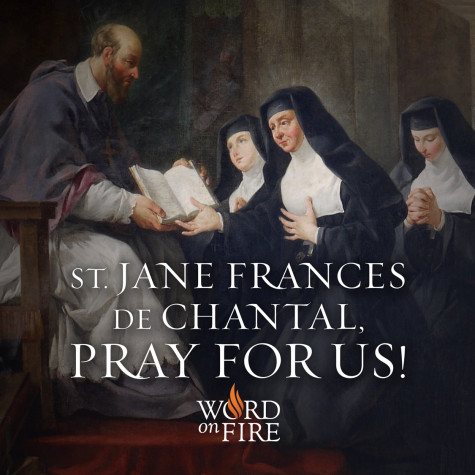 St. Jane Frances de Chantal (1562-1641) –
St. Jane Frances de Chantal (1562-1641) –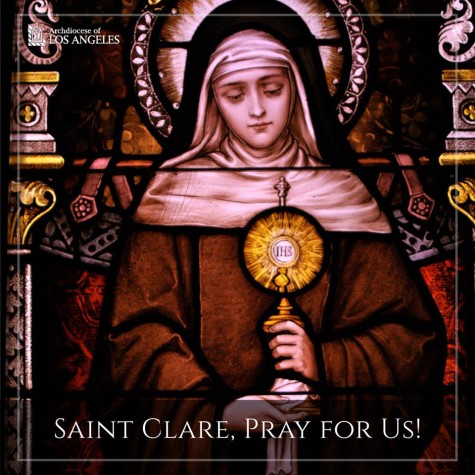 St. Clare of Assisi (1194-1253)
St. Clare of Assisi (1194-1253)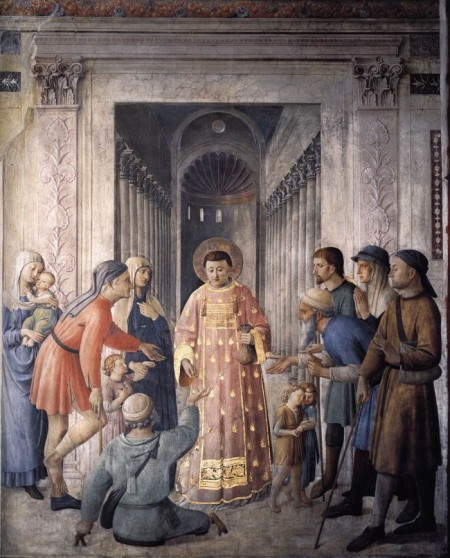 Saint Lawrence Distributing Alms –Image: Pinterest
Saint Lawrence Distributing Alms –Image: Pinterest  Saint Teresa (Edith Stein) Benedicta of the Cross
Saint Teresa (Edith Stein) Benedicta of the Cross